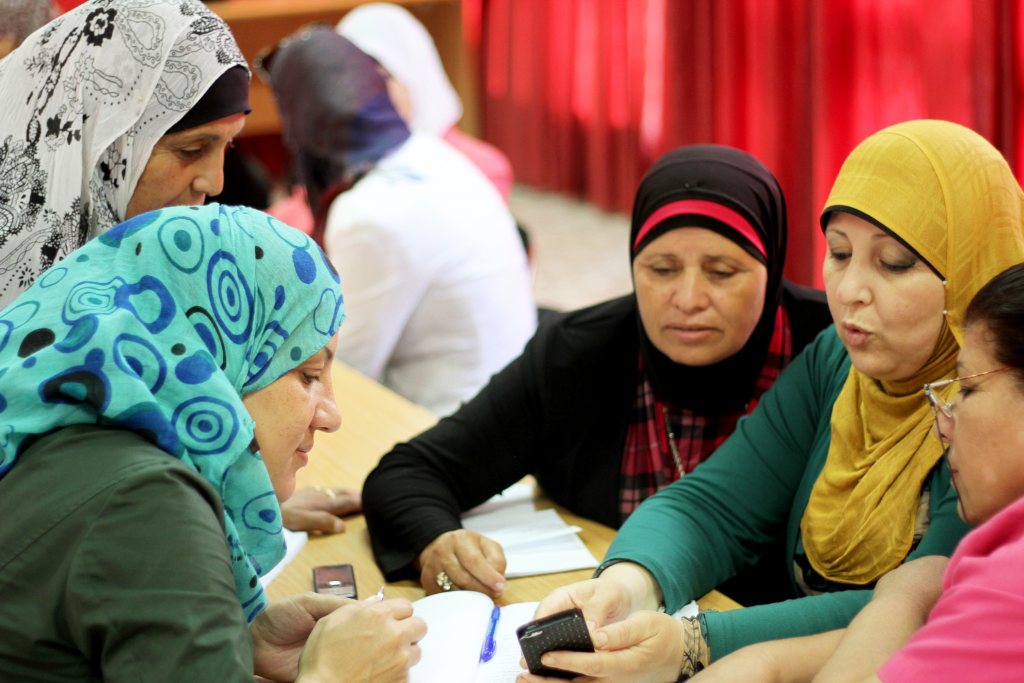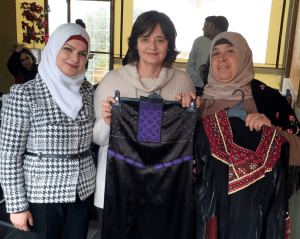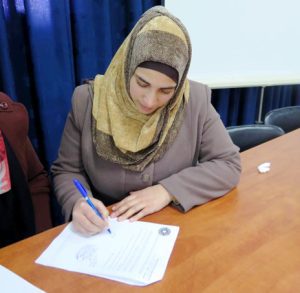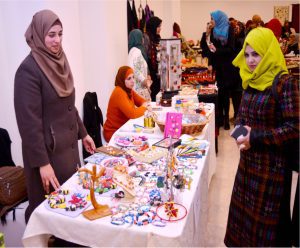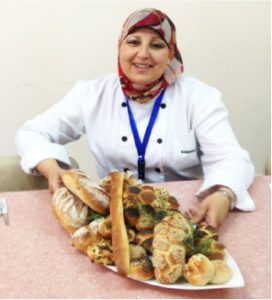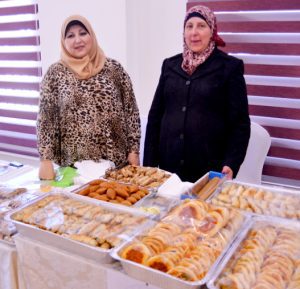Women play a key role in the Palestinian economy, yet Palestine has one of the lowest female labor participation rates in the world due to conservative social norms, limited access to financial resources, and lack of support. NEF works to empower Palestinian women to overcome these barriers that often keep them from realizing their full economic and social potential by helping them to expand their businesses through business development training and coaching.
Jameela, Fadia, and Fatmeh, three women who successfully expanded their businesses after taking part in NEF’s trainings, sat down to share their stories:
Jameela Al-Azait
When Jameela’s husband unexpectedly died at a young age, she was left to single-handedly provide for her four young sons. Jameela, from Al-Azaa refugee camp north of Bethlehem, decided to turn her embroidery hobby into a small home-based business as a solution to support her family.
Jameela’s reputation and recognition for embroidery work quickly grew in her community, creating a higher demand for her products.
With a desire to expand her business to meet her increased demand, Jameela signed up to receive six months of NEF’s business development trainings and one-on-one coaching. She received training in business and financial management, branding, and marketing. Although she had owned her own business for several years, this was the first business development training Jameela had received.
Through the program, she was able to participate in local Bazaars to market her products and network with other people who were also a part of a similar line of work. At the Bazaars Jameela gained the attention of a large number of tourists every day—increasing her profits by 30 percent.
Today, Jameela’s business is well known in Hebron and Bethlehem. Along with improving her and her family’s life by turning a small home-based business into a successful embroidery shop, she also employs 15 women—mainly widows—providing them with sustainable income as well.
“My dream now is to expand my business more and more and to create more jobs for the women in need,” Jameela said. “The project not only impacted my business, it has also had an impact on my personality. I was living as a widow and only needed money to pay my family’s expenses, now I want to earn money to continue to improve and grow my business.”
Fadia Zahda
Fadia, a university student from Hebron City and a divorced mother of three, created her own small home-based business—Wonder of Paper—which repurposes scrap paper into art pieces such as sculptures, toys, accessories, and various decorations.
For Fadia, the challenge of being a single parent and soul provider for her family made establishing her business that much more difficult. Despite this, Fadia succeeded in starting her business while completing her studies in “graphic design”.
A few years after the launch of Wonder of Paper, Fadia heard and signed up for NEF’s program. As a result of the trainings, Fadia developed an improved business plan, which led her to later receive a project supported grant. Through this grant, Fadia was able to invest in equipment that more efficiently met the demands of her business and shortened the time she spent handcrafting her products. She was also able to hire four female university students to help her, which in turn allowed them to embark on their own path to financial independence.
With extra time and help on her hands, Fadia has expanded the variety of products she sells to include hair accessories, school supplies for children, medals, and photo albums. She said, “Because of this experience, I have expanded my business. My work has increased. My business capital was 300 NIS (less than $100/month) and now it is 800 NIS (more than $250/month).”
Today, Fadia’s business has grown to the point where she is able to support her family and pay her university loans. She hopes to continue to expand Wonder of Paper, and soon host a summer camp at her store to teach children different forms of art.
Fatmeh Sa’adeh
Fatmeh, a 48-year-old woman from Ramallah city, went from being a chef at a university cafeteria for 14 years to owning a small catering business and expanding it into a café. When she first opened Em Sameer Kitchen Fatmeh could only provide food for pickup orders because her store’s location didn’t include a sink, chairs, tables, or a refrigerator.
Four years after opening her café, still determined to grow her business, Fatmeh applied to NEF’s program. “I participated because I felt that I needed some managerial support,” Fatmeh said. “I have enough experience in making food; however, I was really in need of business and management training.”
After receiving training in marketing, product development, branding, and financial management, Fatmeh submitted her improved business plan and was awarded with a grant and loan of $3,400. She purchased refrigerators and raw food materials helping her to increase production.
After making these improvements to her business model and with the profits she made from the café, Fatmeh opened a dine-in restaurant where people could enjoy her specialty pastries and homemade Palestinian dishes. “Every woman should have a specific goal and vision,” Fatmeh said. “And depend on herself to achieve her goals and dreams.”
Fatmeh still continues to participate in NEF’s project—but this time, she works as a mentor for a different group of women entrepreneurs who want to see their businesses flourish. Through the improvement of her business model, Fatmeh’s business has substantially grown requiring her to hire additional employees to keep up with the café’s demand.
Today, Fatmeh reflects on her experience as a women entrepreneur:
“If a woman starts her business and she fails, that does not mean she should give up, she should learn from her experiences and become stronger to start again.”
Working primarily in Bethlehem, Ramallah, and Hebron NEF has trained 524 women in business development, of which 267 have expanded their businesses creating 330 new jobs for women.
NEF UK’s women’s entrepreneurship projects in Palestine are conducted in partnership with the Cherie Blair Foundation for Women, the Rangoonwala Foundation, the Oak Foundation, and the Trafigura Foundation.
To read more about this work, click here.

